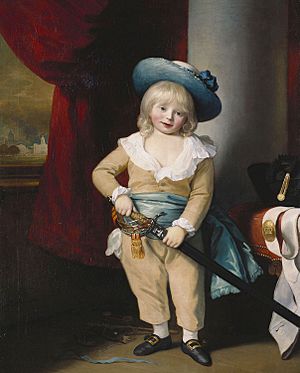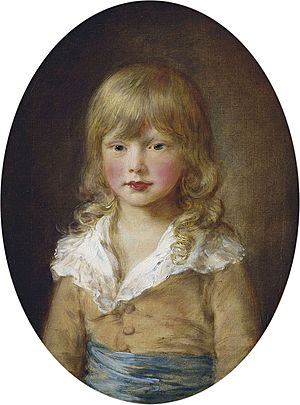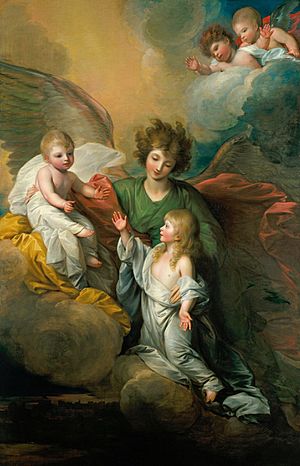Prince Octavius of Great Britain facts for kids
Quick facts for kids Prince Octavius of Great Britain |
|
|---|---|

Portrait by Benjamin West, 1783
|
|
| Born | 23 February 1779 Buckingham House, London, England |
| Died | 3 May 1783 (aged 4) Kew Palace, Surrey, England |
| Burial | 10 May 1783 Westminster Abbey 11 February 1820 Royal Vault, St George's Chapel, Windsor Castle |
| House | Hanover |
| Father | George III, King of the United Kingdom |
| Mother | Charlotte of Mecklenburg-Strelitz |
Prince Octavius of Great Britain (born February 23, 1779 – died May 3, 1783) was a son of King George III and Charlotte of Mecklenburg-Strelitz. He was their thirteenth child and eighth son.
Octavius died at the young age of four. This happened a few days after he was given a special treatment to protect him from smallpox. His death made his parents, especially his father, very sad. King George III loved his two youngest sons, Octavius and his brother Alfred, very much. Later in his life, when the King became ill, he would sometimes imagine that his sons were still with him.
Contents
Early Life of Prince Octavius

Prince Octavius was born on February 23, 1779. His birthplace was Buckingham House in London. He was the thirteenth child of King George III and his wife, Charlotte of Mecklenburg-Strelitz.
The name Octavius comes from a Latin word meaning 'eighth'. This shows that he was the eighth son born to his parents. When he was born, the House of Lords sent congratulations to the King.
Christening Ceremony
Octavius was christened on March 23, 1779. This special ceremony took place in the Great Council Chamber at St James's Palace. Frederick Cornwallis, who was the Archbishop of Canterbury, led the christening.
His godparents were important people from other royal families. Some of them could not be there, so other important people stood in for them.
A Loved Royal Child
Charlotte Papendiek, who worked for Queen Charlotte, described Prince Octavius as "a lovely child of sweet disposition." She also said he showed "every promise of future goodness."
King George III was a very loving father to his young children. This was a bit unusual for kings at that time. He tried to be at their birthday parties and other fun events. A friend once saw the King happily carrying his youngest children, Sophia and Octavius, in his arms.
Mary Delany, another friend of the King, remembered meeting Octavius. She wrote that King George carried Octavius to her. The young prince then held out his hand to play and kissed her cheek when his father asked him to. Even though it was not common for royal families to show so much love in public, people praised how the King and Queen raised their children.
Another person wrote that George and Charlotte "have their children always playing about them." In the evenings, the children would play with their parents for an hour or two. The King also kept up with how his children were doing in their studies.
Octavius and His Siblings
Octavius was very close to his sister Sophia. She was the sister closest to him in age and even called him "her son." In the summer of 1780, he went with Sophia and their siblings, Elizabeth and Edward, to Eastbourne. This trip to the seaside was so he could breathe the fresh air.
When Octavius was 19 months old, his younger brother Prince Alfred was born. This made Octavius an older brother. Sadly, Alfred died on August 20, 1782, when Octavius was three years old. After Alfred's death, Octavius became the youngest member of the royal family again.
Horace Walpole, a writer, shared that King George was very sad about Alfred's death. The King said, "I am very sorry for Alfred; but had it been Octavius, I should have died too." This shows how much he loved Octavius.
In 1820, a historian named Edward Holt wrote about Prince Octavius. He said that even though Octavius was not yet five years old, he was "very docile" and had "good-nature in such an uncommon degree." Everyone around him loved him. Another writer, John Watkins, added that Octavius was "reckoned one of the finest of the royal progeny."
Prince Octavius's Death

Six months after his brother Alfred died, Octavius and Sophia were taken to Kew Palace in London. They were there to be protected from the smallpox virus. Sophia got better without any problems. However, Octavius became ill and died a few days later, on May 3, 1783, in the evening. He was only four years old.
Lady Charlotte Finch, who was the governess for the royal children, wrote that "Prince Octavius died last night." She also said that from the moment he got sick, there was no hope he would get better. It was a tradition that the royal family did not go into official mourning for very young children who passed away.
Octavius was the last member of the British royal family to get smallpox. People in the royal household said that his death was not caused by the protection he received, but by a cold. Most stories about King George III and his family do not say why Octavius died. However, a few mention the protection as a possible reason. The Royal Archives, which keep official records, only note the date and his age when he died.
On May 10, Octavius was buried next to his brother Alfred at Westminster Abbey. Later, their oldest brother, who became King George IV, moved their remains. On February 11, 1820, they were moved to St George's Chapel, Windsor Castle.
Impact on His Parents
Queen Charlotte said that Octavius's death was a complete shock. She wrote to a friend who had also lost a child, saying she had felt that pain twice. The last time, with Octavius, she had no warning. She said that in less than two days, her son Octavius went from being perfectly healthy to being sick and dying. Octavius's death greatly affected Queen Charlotte, both emotionally and physically. At the time, she was expecting her youngest child, Princess Amelia.
Octavius's death deeply saddened his father, King George III. Walpole wrote that "the King has lost another little child; a lovely boy, they say, of whom their Majesties were dotingly fond." Everyone at the royal court, especially those who cared for the young prince, was also very upset by his sudden death.
Soon after, King George said, "There will be no Heaven for me if Octavius is not there." The day after his son died, the King walked into a room where artist Thomas Gainsborough was finishing paintings of the royal family. The King asked him to stop. But when he found out that Gainsborough was painting Octavius, he allowed the artist to continue. When this painting was shown a week later, Octavius's sisters cried in front of everyone. Their parents were also visibly moved.
Three months after Octavius's death, his father was still thinking about his son. He wrote to Lord Dartmouth that every day "increases the chasm I feel for want of that beloved object [Octavius]." In later years, King George would sometimes imagine talking to his two youngest sons. During one of the King's periods of illness in 1788, he even mistook a pillow for Octavius, who had been gone for five years.
Titles and How He Was Addressed
Throughout his short life, Octavius was known as His Royal Highness The Prince Octavius. He held the title of a Prince of Great Britain and Ireland.
Family Tree
| Ancestors of Prince Octavius of Great Britain | |||||||||||||||||||||||||||||||||||||||||||||||||||||||||||||||||||||||||||||||||||||||||||||||||||||||||||||||||||||||||||||||||||||||||||||||||||||||||||||||||||||||||||||||||||||||||||||||||||||||||||||||||||||||||||||||||||||||||||||||||||||||||||||||||||||||||||||||||||||||||
|---|---|---|---|---|---|---|---|---|---|---|---|---|---|---|---|---|---|---|---|---|---|---|---|---|---|---|---|---|---|---|---|---|---|---|---|---|---|---|---|---|---|---|---|---|---|---|---|---|---|---|---|---|---|---|---|---|---|---|---|---|---|---|---|---|---|---|---|---|---|---|---|---|---|---|---|---|---|---|---|---|---|---|---|---|---|---|---|---|---|---|---|---|---|---|---|---|---|---|---|---|---|---|---|---|---|---|---|---|---|---|---|---|---|---|---|---|---|---|---|---|---|---|---|---|---|---|---|---|---|---|---|---|---|---|---|---|---|---|---|---|---|---|---|---|---|---|---|---|---|---|---|---|---|---|---|---|---|---|---|---|---|---|---|---|---|---|---|---|---|---|---|---|---|---|---|---|---|---|---|---|---|---|---|---|---|---|---|---|---|---|---|---|---|---|---|---|---|---|---|---|---|---|---|---|---|---|---|---|---|---|---|---|---|---|---|---|---|---|---|---|---|---|---|---|---|---|---|---|---|---|---|---|---|---|---|---|---|---|---|---|---|---|---|---|---|---|---|---|---|---|---|---|---|---|---|---|---|---|---|---|---|---|---|---|---|---|---|---|---|---|---|---|---|---|---|---|---|---|---|---|---|
|
|||||||||||||||||||||||||||||||||||||||||||||||||||||||||||||||||||||||||||||||||||||||||||||||||||||||||||||||||||||||||||||||||||||||||||||||||||||||||||||||||||||||||||||||||||||||||||||||||||||||||||||||||||||||||||||||||||||||||||||||||||||||||||||||||||||||||||||||||||||||||
See also
 In Spanish: Octavio de Gran Bretaña para niños
In Spanish: Octavio de Gran Bretaña para niños
 | William L. Dawson |
 | W. E. B. Du Bois |
 | Harry Belafonte |

